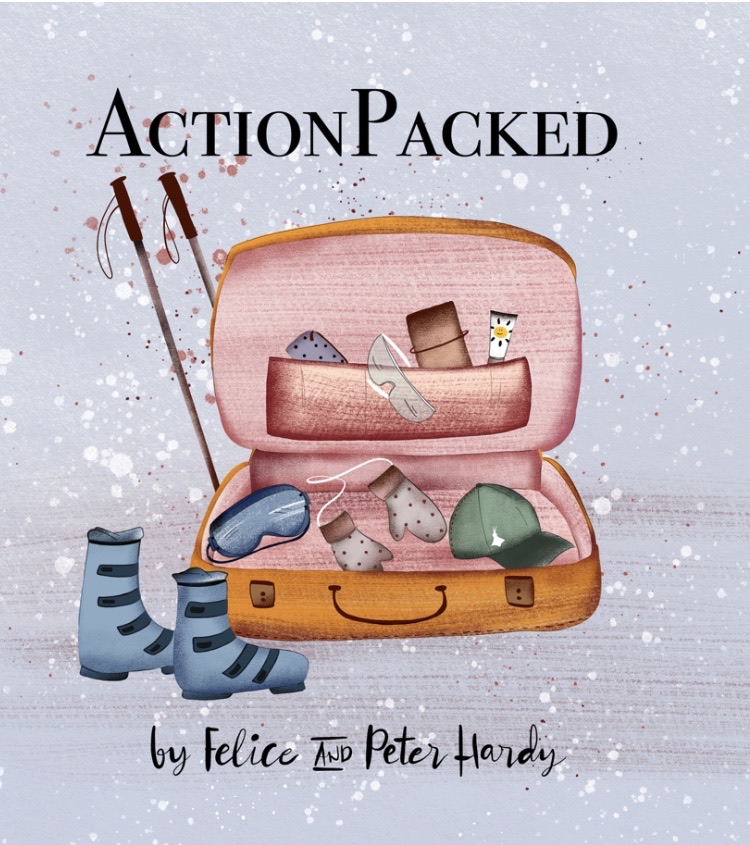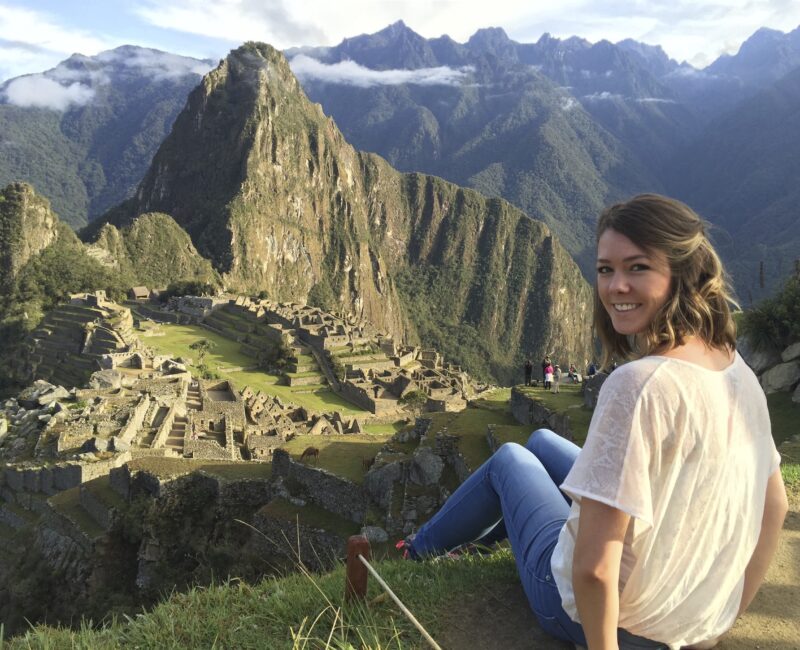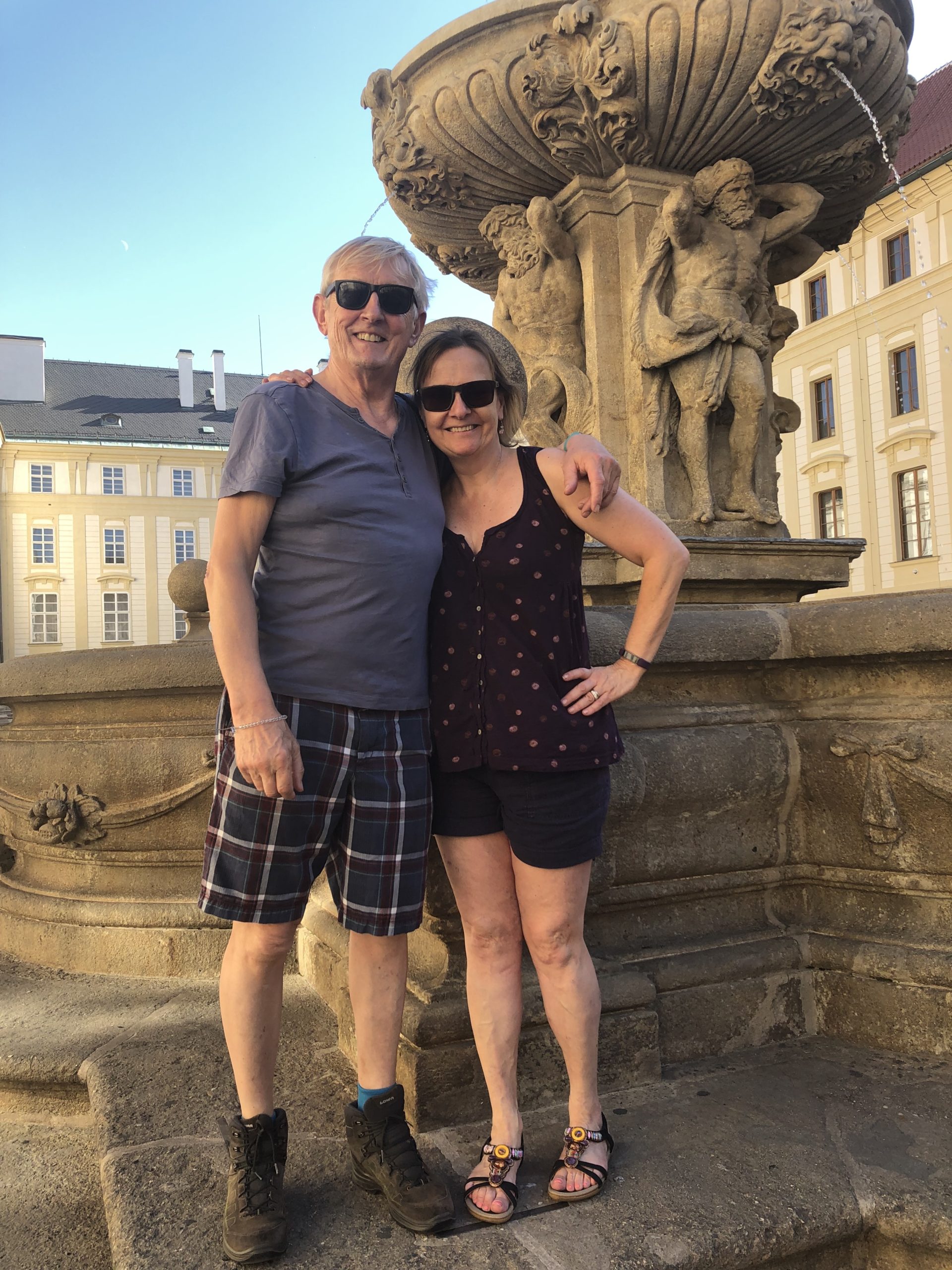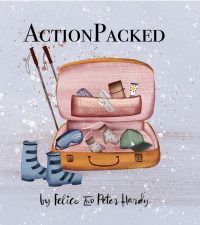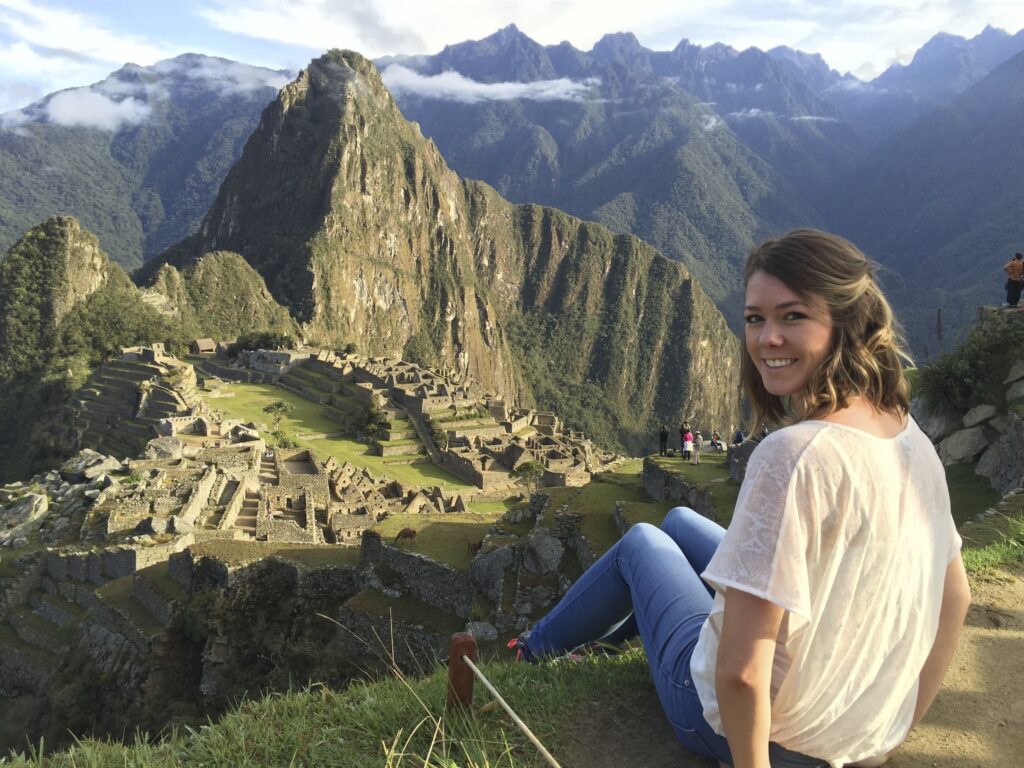
Leah at Machu Picchu. Photo: © G Adventures
Peter Welcome to our travel podcast. We’re specialist travel writers and we’ve spent half a lifetime exploring every corner of the world.
Felice We want to share with you some of our extraordinary experiences and the amazing people we’ve met along the way
Peter This week, as travel for many of us makes a slow return to our lives, we’re taking a look at the future of tourism. Can we really justify the kind of self-indulgent holidays that we used to have back in the day before Covid? Shouldn’t we now concentrate on truly sustainable and responsible tourism, distributing the vast wealth of travel to local people around the globe rather than filling the pockets of international all-inclusive hotel groups?
Leah Whitfield is communications manager for the eco-conscious Canadian operator, G Adventures. Leah, you’re a professional traveller and do it for a living. How did this all begin for you?
Leah Sometimes I wake up and I just think ‘I can’t believe this is my job, that I actually get paid to work in travel.’ For me, the journey to get into travel was quite a long one. Originally I trained as a journalist and fell quite quickly into PR, but that was PR focused more on luxury fashion and beauty – so a million miles away from what I’m doing right now. That was based over in the Middle East and I worked over there for a few years. Then fortunately, at the end of my time there, I was able to take some time off and I travelled around the world and visited different countries over the course of a year. That was really where I got the bug, and I thought: ‘How can I get this to be part of my career?’
I was very fortunate; I managed to get myself into an agency in London where I was working with luxury hotels. And that was an amazing experience, it really gave me the time to learn the ropes, but it didn’t necessarily match the type of travel that I’m really passionate about. So a few years ago I wrote a list and I thought to myself, what do I want from a career but also what do I want from an employer? What do I want my work to have meaning about? One of those things was really matching up with my values.
It was so strange – the next day someone messaged me and said: ‘Have you seen that G Adventures are hiring?’ And I thought I just couldn’t believe it, because these roles never come up, in-house roles very rarely come up because people don’t like to leave because they’re so great. It was only fortunate that the person who was working in this role actually was staying in the company, but moving to a different destination.
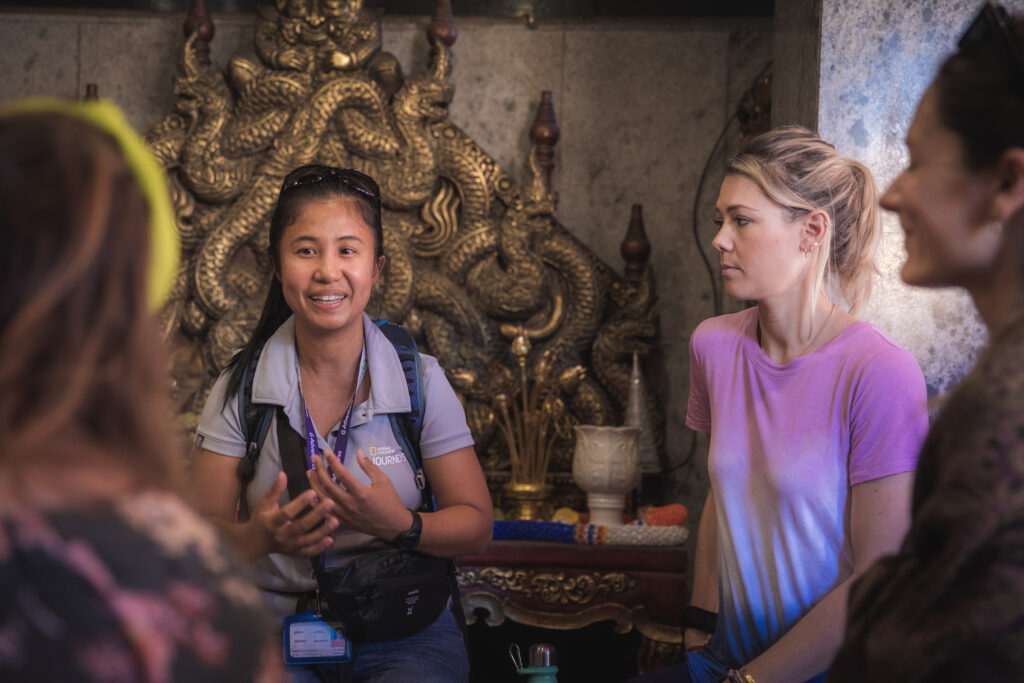
Leah on Chiang Mai Temple Tour, Thailand. Photo: © G Adventures
Peter So tell us about G Adventures. What is it?
Leah G Adventures is Canadian-founded small group adventure operator and we run small group adventures all over the world. So pre-pandemic, we were operating in over 100 different countries; 750 different trips. But when most people think of adventure, they think: ‘Oh, gosh, I’m going to be flinging myself off a cliff and climbing a mountain.’ We definitely do offer those types of adventures, but we recognise that adventure is very personal to everybody. And so that could also mean going and staying with a local family in Italy on a limoncello farm, or it could be going to a food market in Thailand. So we do all of those different broad types of trip.
Felice Have you travelled since you were a child?
Leah As a child growing up, most of my travel was just two weeks over to France in a caravan, you know, a lot of the British summer holiday type. But I think one of the biggest moments for me – when it came to opening my eyes up to the potential of travel – was when my mum and my dad took my sister and I over to Zimbabwe as little girls. This wasn’t an organised trip or anything; this was simply because my uncle worked over there and he was working on a project that was helping the elimination of the tsetse fly issue. So that meant he was based out in the bush and was doing a lot of research on the cattle and the wildlife and the buffalo over there.
So suddenly, at eight years old, I’d gone from a tiny little village near Bristol where I didn’t really travel much, to suddenly being submerged in the bush in the middle of Zimbabwe and being told that we had to sleep in huts that were made out of dung and had chicken wire for windows to stop elephants putting their trunks through them. It was the first time, really, that I experienced poverty. It was the first time that I had my eyes really open to any kind of culture that was different to what I was used to. I really think that was the start for me of thinking…or opening my eyes up to the world and realising that things were bigger than just outside Bristol.
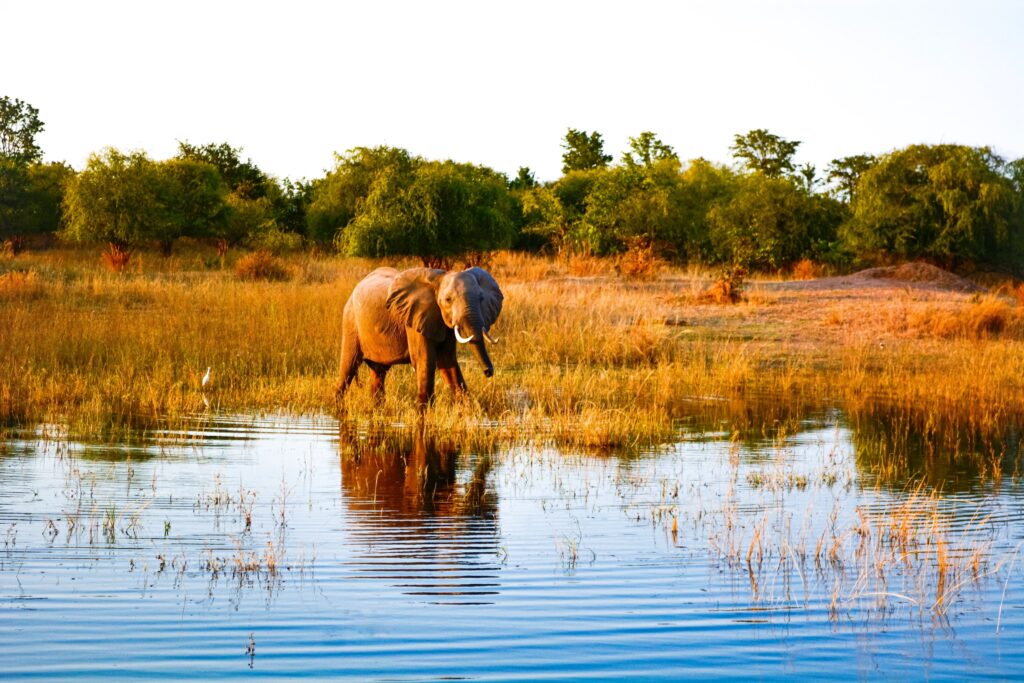
Zimbabwe scenery. Photo: © Arpit Rastogi/Unsplash
Felice Does that mean that Africa is still a favourite place of yours?
Leah Africa has such a dear, dear part of my heart. It was obviously the start for me of one of my first very big adventures. But then I would say also one of my other most formative adventures was after university. I think a lot of people normally – before university – would take a gap year but I didn’t, I went straight in. I always felt a bit like I’d potentially missed out a little bit on that experience. So after university, when I graduated, I decided to take a few months and go back to Africa.
A friend of mine came with me and we went to Kenya and we were based in Mombasa, working in a project that was basically taking street children – or street boys specifically – off the streets of Mombasa, doing their drug rehabilitation and getting them into school. So we spent months basically working on what they called the halfway house where we would be going out into the slums and we would be conversing with the children and explaining about the project and basically trying to persuade them that if, next time we came, if they weren’t on substances – which they use quite often to suppress hunger – if they weren’t on these substances, then we would take them back into the project and then we would help them get into a school.
At the time, I thought that I was doing something really, really great. But now in my role in G Adventures we’ve really started to look at child welfare and child interaction through travel. I think that what I didn’t necessarily realise, I was very naïve and this is something that we see so often…that you think that you’re making a positive impact on these children’s lives, but you’re coming in as an outsider and building very strong bonds with those children then after a few weeks disappearing. Whilst it might be a one-off experience for you, this is happening time and time and time again for these children. So actually, the whole voluntourism sector is something that really needs, I think, more publicity on what is the right thing to do when it comes to those sorts of experiences.
Felice What do you think is the right thing to do?
Leah Well, we at G Adventures don’t offer any sort of voluntourism. There are ways that it can be done responsibly; I think one of the main things is making sure that you’re not taking any jobs away. That could be done by a local person, this white saviour coming in and effectively taking a job or painting a school – that’s taking a job away from someone that could benefit from it locally and also, you know, making sure that you’re having responsible interaction with children.
If you think about it as a tour perspective, people going away on a trip…if you have a child that comes up to you on the streets and is trying to sell you sweets, for example…by buying those, you are basically endorsing that child being there and their guardian or parent or whoever it is that’s keeping them on the streets has no incentive to put them in school because they’re effectively earning money.
Then if you think about school visits, if you’re on a trip and you are going into a school classroom, when we worked with it through G Adventures we did do school classroom visits, and what we actually found when we audited it was that sometimes these kids were receiving groups multiple times a day. Every time they stand up and they greet the group, it becomes incredibly disruptive to their education.
So the kind of line that we take is that if you wouldn’t do it at home, don’t do it while you’re away. And it comes down to everything – photos with children, you wouldn’t take a photo with a child on the streets of London so why is it OK to do it when you’re in a destination? So I think if you have that line and you think about it when you’re away, that’s probably a good guide.
Felice That’s amazing; I never knew any of that. I had never really thought about it in that way.
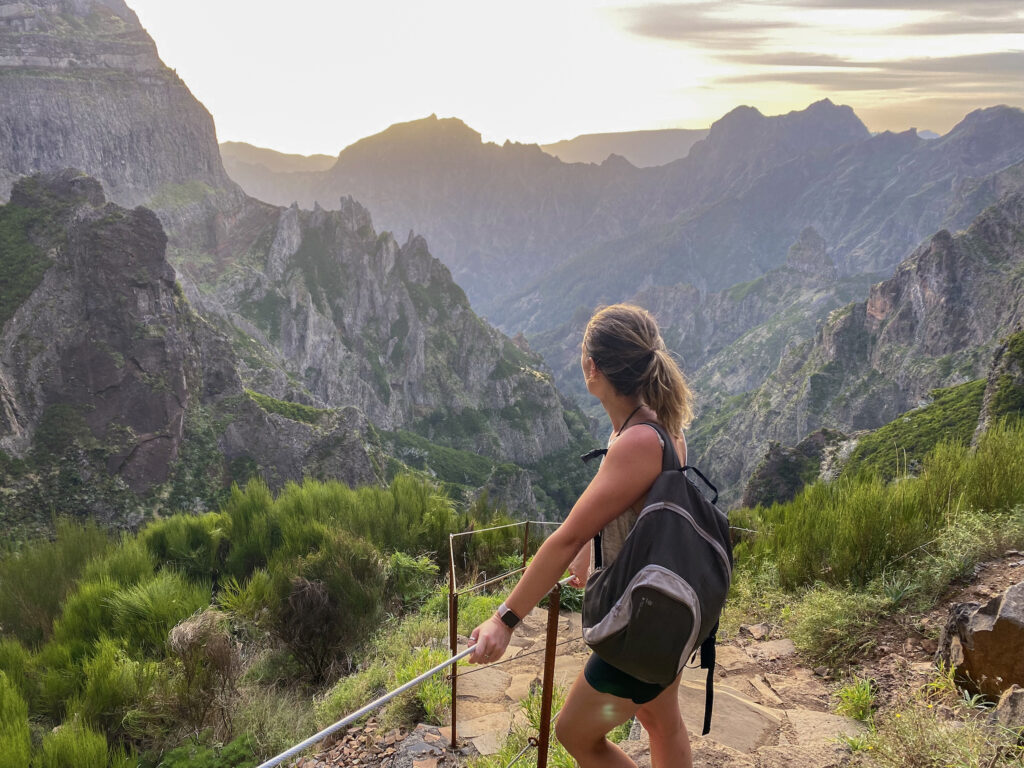
Picodo Arieiroto–Pico Ruivo hike in Madeira. Photo: © G Adventures
Peter Then moving away from that to high adventure, where have you been and what have you done?
Leah Do you know what, I think actually writing my CV to apply for my job at G Adventures it certainly made me think: ‘Gosh, I’ve actually done quite a lot. This is very cool and I’ve been fortunate enough to continue that.’ So, yes, as I said, I started with a trip in Africa and actually after my time volunteering it turned into a backpacking trip. So backpacking down through Tanzania and ended on Zanzibar, and that was with no support. It was literally with a copy of Lonely Planet in our hands and booking B&Bs along the way and it was full of mishaps, but it was honestly one of the most joyous and fond trips that I look back on. But since then, I’ve been really fortunate to do some incredible trips.
I think for me, one of the most emotional trips that I did was the Lost City Trek in Columbia. I did that a few years ago and in the north of Columbia there’s a big area called the Sierra Nevada region, which is a big national park and that’s home to four indigenous tribes. The Lost City years ago hit the headlines for not great reasons – a group was actually abducted and suddenly the press started getting interested and was thinking, where is this Lost City?
And since then…they were all returned safely…but since then and in recent times, it’s become a bit of a haven for hikers who want to have an amazing jungle trek experience up to this indigenous lost city. For the indigenous culture, the Ciudad Perdita was never lost to them – but it was lost to the West. The only way you can get up there is on foot or by mule. So sometimes you see people doing the effective walk of shame by taking the mules, but most of us were on foot. What made it really, really special was that at the time, very few of the indigenous community were actually able to benefit from this tourism.
This is something that you see across the world where these routes become very, very popular and they pass by local communities. But there’s no wealth distribution, there’s no engagement with those communities, and so they weren’t benefitting. The indigenous communities actually set up a company called Wiwa Tours – the Wiwa is one of the indigenous tribes – and they decided that they were going to basically start their first indigenous-owned travel company. G Adventures was the first adventure operator to work with them, so it means that when you do the trip, you’re actually led by an indigenous guide and you’ll also have G Adventures guide with you who will translate.
I remember five days of walking, zero phone signal completely off-grid in the depths of the jungle. You’re sleeping in hammocks or in bunk beds in these tiny little jungle camps, and you’re hearing from these indigenous people about their ancient traditions and their customs that you just have no opportunity otherwise to to understand these amazing people. And whereas we were probably one of the only groups that had an indigenous guide, it meant that when we did get to the Lost City, our understanding of the sacred site was so much more profound than others who had just hiked up there and were like: ‘OK, great, great. We’ve made it to the Lost City.’
We did a special blessing ceremony before we entered the city. It was a really beautiful and very emotional experience. Then you do the trek back, come back on yourself. There’s actually a unique route that G Adventures does where we go into – or go past – an indigenous village. The indigenous community are governed by what they call the mamo, who is the head spiritual leader and the imam. He met us on the river and he had to do a soul-cleansing ceremony for each of us before we were allowed to cross the river and go into the indigenous region.
I just remember standing there and him putting his hand on my head and me having no idea what he was saying. It sounds really corny, but this big gust of wind blowing down river and me getting goosebumps all over my body and just basically starting to cry and just feeling so emotionally moved and thinking how incredibly fortunate that we are able to interact with these people and knowing that by having this incredible experience, we’re also helping support and conserve their indigenous cultures.
So for me, I think whenever anyone asks me about the Lost City, I’m like: ‘Please do it. It’s one of the best things.’ I mean, it was definitely a tough hike. I put that out there and it was torrential rain and we were slipping and sliding. It was hilarious. There was one moment where we were in ant formation, one after the other, and the back person started slipping and it was just everybody bang, bang, bang into each other and everyone was in the mud. Somehow the indigenous guide, who was ironically dressed in pure white, was absolutely untouched. He’s just sort of hopping through the mud like a little fawn, we were rolling around like turtles in the mud. But, yes, that was a really, really special trip.
Felice How many people would go with a guide?
Leah So you have our trips are maximum 16, and on the trip you’ll have one indigenous guide and one G Adventures chief experience officer as well. So we average around 12 usually on the trip.
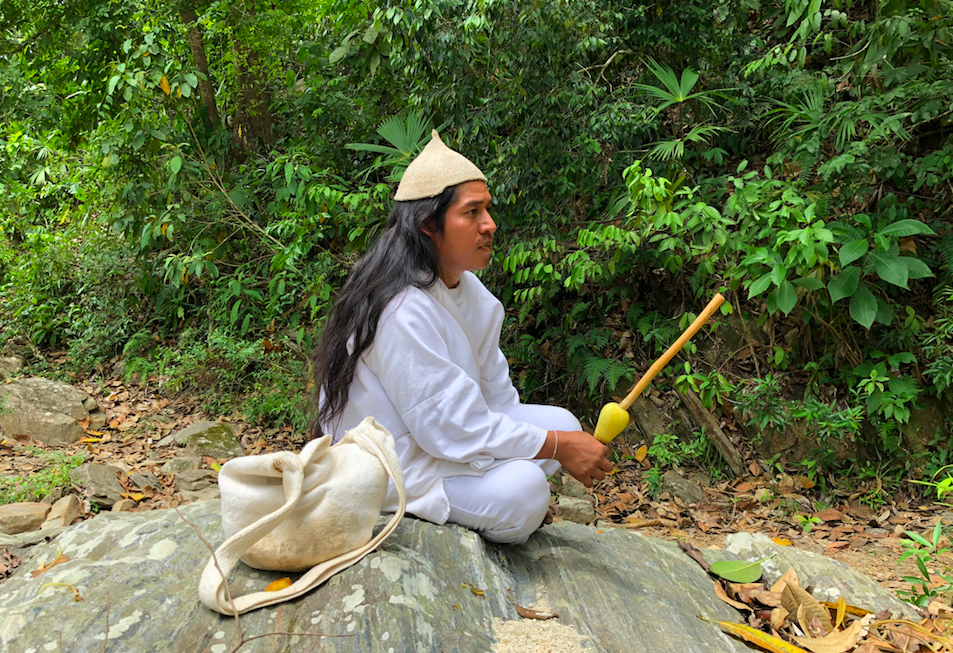
Mamo from the Wiwa community. Photo: © G Adventures
Peter Anywhere else in Latin America you’ve been to?
Leah Yes, I’ve been all over. So I actually spent four months in there during my round the world trip, travelled to Peru, Bolivia, Chile, Argentina and Brazil. Peru is a real favourite of mine and I worked for an incredible eco hotel resort called Inkaterra that was founded by an amazing family that basically wanted to pioneer eco tourism in Peru. They have these jungle lodges in the Amazon where you’ll be walking along canopy walkways and sleeping in tree houses and going along the Madre de Dios river looking for caiman and piranhas. They’re a really, really incredible company for those that are looking for the luxury experience, but also knowing that they’re doing good. The Inca Trail is the really famous trail in Peru, but I did the Inca jungle trail which is slightly less well advertised, I guess.
I think people become very fixated on the Inca Trail. What a lot of people don’t realise is that there’s so many hundreds of kilometres of Inca trails around that region in the Andes. That one route has been marketed as the main route and is actually permit-ed, so it’s restricted and you can’t have as many people on it – actually with Covid they’ve now limited that capacity down to 50% so it’s not always easy to get your permits.
I decided to do the Inca jungle trail because it included some of those ancient Incan routes, but also had things like zip-lining and whitewater rafting and was much more sort of multi-sport. I do remember doing the whitewater rafting and getting out of the boat and dragging the raft up the sand, and it must have been 10 metres to get to the van. And someone said to me: ‘Oh, my goodness, look at your legs!’ I looked and they were just trickling with blood – the sandflies had all descended onto my poor legs. I think we counted and I had over 80 bites across both legs.
Felice That sounds horrible!
Peter That’s your nightmare, Felice, isn’t it?
Leah Yes, I spent quite a lot of the next day hunting around pharmacies up in Aguas Calientes, which is the little town beneath Machu Picchu, desperately trying to find some antihistamine cream, but it’s all part of the travel experience.
Felice Have you had any other travel experiences that haven’t quite gone right – where something’s happened that was unpleasant?
Leah I don’t think that you’ve really travelled if you haven’t. What I always say to people is, please don’t be too fixated on your plan, because travel is meant to go wrong in some ways. I mean, obviously, we don’t want to go too wrong, but deviating a little bit off the itinerary or unexpected mishaps are really what makes for the great travel stories, after.
Peter I think that’s all part of the adventure.
Leah Exactly. If it was all completely planned, it would just be incredibly sterile. Yes, I did have a few few mishaps. I think the one that my family always bring up at Christmas time is the time that I was bitten by a monkey in Africa. It was completely my own fault because this monkey was allegedly a pet monkey…again back in the time where I didn’t really know better about animal welfare and I definitely wouldn’t have condoned it nowadays. I asked the guy if the monkey was friendly and he said: ‘Oh, yeah, yeah, no problem, no problem.’
Next thing, the monkey was gripping onto my finger with its teeth. I went back to the group and I said: ‘I can’t believe it; that monkey’s just bitten me.’ They said: ‘OK, we need to find a hospital,’ and I said: ‘Why?’ And they were like: ‘We need to go and get your rabies shot.’ And I said: ‘No, no, no, it’s fine. I’ve had my rabies injection already.’ And they said: ‘Yes, you realise that only buys you 24 hours, it doesn’t make you immune.’ And I said: ‘Well, I did not have that explained to me at the travel clinic.’
Peter I think a lot of people don’t know that.
Leah They don’t know that; I didn’t know that. I think we had about four dollars a day to live on each, so we were staying in these little wigwams that were made out of reeds. This African doctor was called and he showed up and said hello and gave me my injection. I am absolutely petrified of needles so they actually said he had to chase me around this wigwam a little bit before he came and jabbed me in the arm. I actually got very sick off the bite; they think there was something in the saliva. I’ve never been so poorly in my life.
Peter It was very lucky you had the jab. If you don’t like injections, the jab used to be three injections through the stomach wall.
Leah Well, I’m really glad that that’s not the case now. So I got very, very sick. At the time I was 21 and I don’t even remember doing this, but I put a call back in to home and I was saying: ‘Oh my gosh, I think I’m dying. I’m so sick.’ I must have been hallucinating at the time and my poor mother was beside herself and I said: ‘This African doctor he’s given me this injection.’ She was trying to board the next flight over to Tanzania, but obviously you need your yellow fever injections to get into Tanzania, so she couldn’t get in.
I must have slept for a few days. And the girls who I was with took the SIM card – we were all sharing one phone – and took that my SIM card out of the phone and put theirs in and went off around their business for those few days while I was resting, and my mum just couldn’t get hold of me. So by the time I came round and was more with it, I put the SIM card back in and I just remember these messages coming through and thinking: ‘Oh-oh.’ So that story always comes up at Christmas. My mum says: ‘Do you remember the time that you did this?’ ‘Yes, I remember.’ As I said, there’s always those moments, but they make for good travel content, I think.
Peter Then I think your company had also pioneered rural home stays in Japan. That sounds unusual.
Leah We look at communities where they haven’t aren’t necessarily able to benefit from tourism, like I said with the Lost City, where they are a little bit removed from that tourism chain. Down in the south there’s this rural community in an area called Hagi. It’s an agricultural community, but there’s very little prospect. There’s no bullet trains that go in there; there’s no airport, so tourism just isn’t going to go there. So it means that a lot of the youth go up to the big cities to be able to work. What you’re left with is an ageing and fairly disempowered community.
So what we have done with the non-profit partner, Planeterra, that we work with is we’ve basically set up home stays with these elderly members of the community. We’ve redirected our tours specifically to go to Hagi. You basically divide the group up and you have maybe two travellers per home stay. When we went down to experience this whilst we were staying in Japan, we were allocated this little old lady called Akiko.
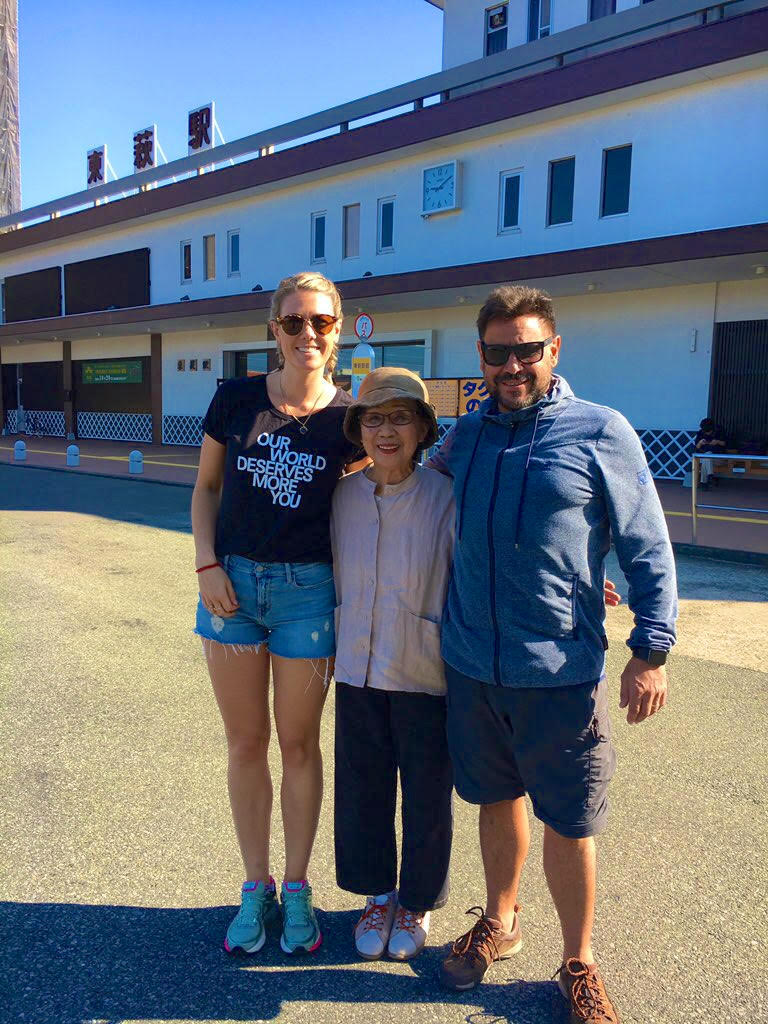
Leah, Akiko, and Bruce. Photo: © G Adventures
Akiko must have been under five foot; she was really little and she was just adorable. She didn’t speak any English; there was absolutely zero option of us communicating, but we did have this little robot that you basically speak into like a walkie-talkie. I would speak into in English and it would churn out in Japanese and then she would speak in Japanese and it would churn out in English.
I was sitting at her kitchen table and I was looking around and she’s busy cooking and she’d been trying to teach me how to make sushi. You look around and there’s all these little trinkets and it really reminded me of my grandparents’ place when I was a little girl. You just suddenly realise: I am sitting inside someone’s life right now. It was like a little window’s been opened and I got to come into this complete stranger’s home and they opened their home up to me and shared a little bit of their life. It was again a really beautiful exchange; we chatted away through this little robot all night. She was so happy and proud to have us in her house.
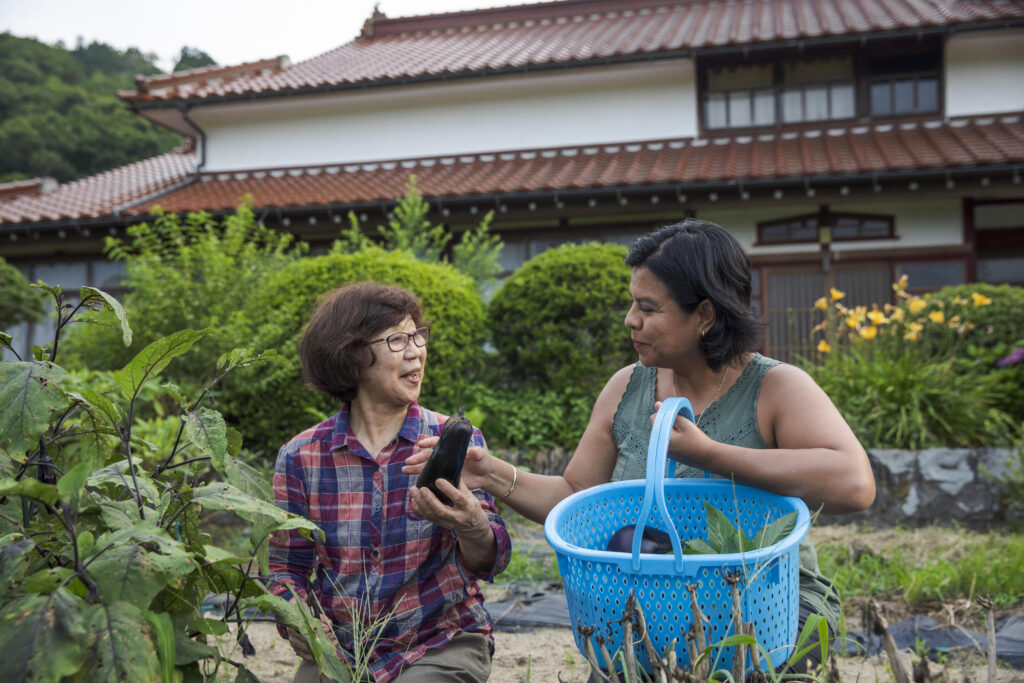
Akiko and another traveller. Photo: © G Adventures
The next day was a bit of a disaster. Hagi is filled with beautiful rice paddies and hills, and it’s stunning. I woke up and it was all misty and I just thought: ‘Gosh, this is perfect, I want to go for a run.’ So I said to her: ‘I’m going running.’ She looked at me like I was absolutely bonkers and off I went. Anyway, I managed to get myself very lost and I was looking up these roads thinking maybe it was this road, no it wasn’t that road so maybe it was this road. I was going forwards and backwards; I was just so confused, I had no idea where I was basically. I had no telephone and no one in the area spoke any English, so I sat on the side of the road and just waited and waited and waited.
Eventually Akiko came along in her little car and she was so worried. I think for them hospitality is a very important part of their culture and she felt so responsible for the fact that I was silly enough to have got myself lost. I kept saying to her: ‘No, it’s completely my fault, Akiko, I’m so sorry. I’m so, so sorry.’
Felice We’ve always been told when we go to Japan to write something down or get the owner or the hotel manager or wherever you’re staying to write down the name of the place.
Peter I remember years and years ago in Japan, in particular on Hokkaido which is even more non-English-speaking than the rest of Japan, being given a Paddington Bear label to put around my neck saying: ‘If you find him, bring him back.’
Leah ‘…please return to x.’ So I’ll know for next time!
Felice Where do you think you’d like to go once you can travel normally again, where would be your choice?
Leah It’s funny, I actually was thinking about this yesterday of not just where, but the experiences. I think when people say, ‘What’s your favourite country that you’ve been to?’ I always think what’s my favourite experience that I’ve had, because I think it’s really important to focus on that because going to Spain could be sitting on an all-inclusive beach or it could be staying in cave hotels and hiking the Camino. Everything is so different in a destination.
For me, a destination that I am really, really keen to get to is Bhutan. I’d like to do some of the trekking in Bhutan and they have a really interesting tourism policy where you can only go in with operators. I think whilst I’m working at a company like G Adventures, then Bhutan would definitely be high up on the list. They restrict the tourism numbers as well, so I think that it would be great to go in before it gets busier.
Peter I think one of the problems in the world is death by tourism of whole cities. We were in Prague last year – I say last year, but it was the year before Covid: 2019. The number of people there is stunning, really almost terrifying to see. You can’t even get near the Charles Bridge, I think it was quite impossible.
Leah I think one of the issues is that people just follow a list of recommended hotspots and they just do the same train of destinations that are recommended to them. I really think that the beauty of travel is getting away from those – get out of the city, go stay somewhere local and distribute your money away from big internationally-owned complexes or attractions and actually go and sit and have a meal with a local person. That’s for me where the travel memories really start to be built.
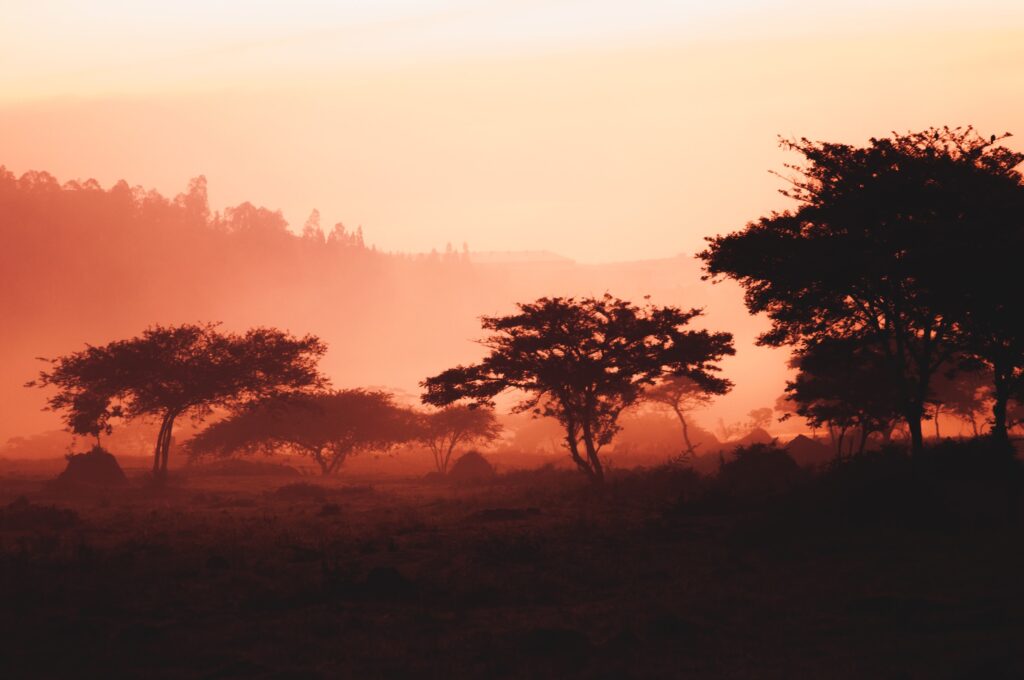
Rwanda scenery. Photo: © Maxime Niyomwungeri/Unsplash
But similarly, we’ve seen the absolute polar opposite with the devastation of under-tourism this year, how the tourism halt has had absolutely catastrophic, devastating effects in all sorts of places. Some of the communities that are most at risk rely solely on the income of tourism and that has a knock-on effect. When you look at places like Uganda and Rwanda, the gorilla trekking…actually, is one of the other top experiences that I would really, really love to do. The challenge that you have is with poaching, when people don’t have other options of income, then they turn to negative practices, encroachment on national parks – we see a lot with conservation challenges. You need tourism to be able to offer them something else to be able to have an income from.
Peter So I think we should all get out there and have more experiences, get away from the beach.
Leah I mean, have a day on the beach, have two days on the beach, but do something else as well. I think it’s a balance. I personally completely agree with you. If I’m going to use my holiday days up and go abroad, I want to really feel like I’ve experienced and done something new and learned something new and met lots of new people. But you can’t deny the fact that there is a very large part of the tourism industry that is that more fly-and-flop sort of demographic and industry.
I think it’s changing people’s mindsets and saying to them: ‘You can still do that, but if you are going to go and lie on a beach for most of your holiday, go and take a tour with a local guide or go and eat in a local restaurant, don’t buy your souvenirs from the hotel shop. Go and buy locally,’ because a lot of people don’t realise that if they’re staying in those sorts of big all-inclusive hotels, their money isn’t getting out of those, it’s not getting into the local economy – into the hands of local people. Leave the complex and actually go and have some local experiences as well.
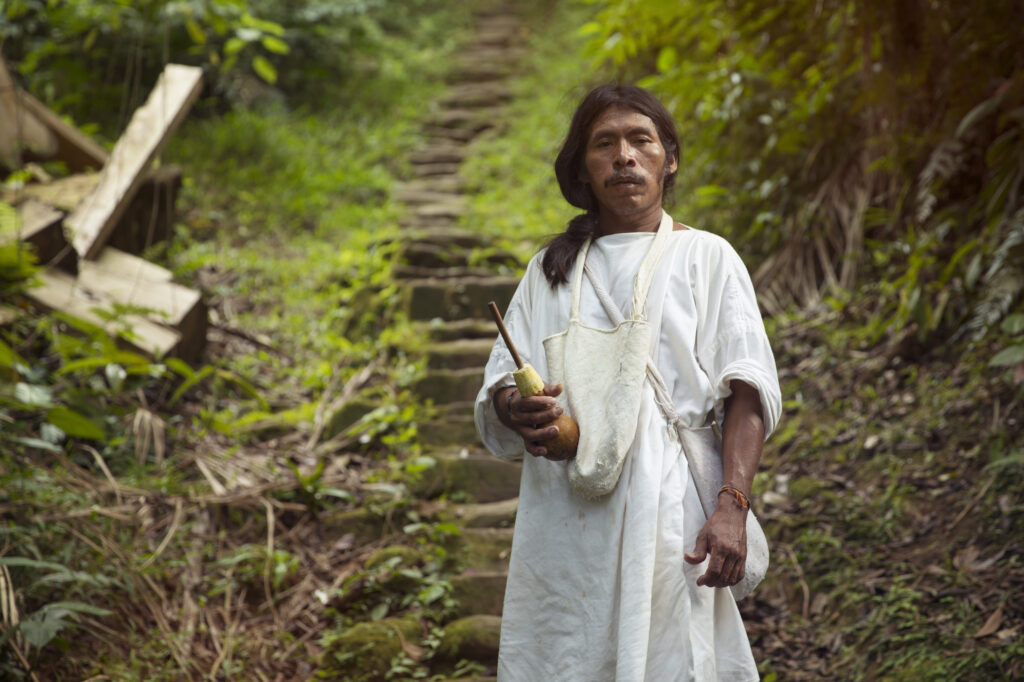
Local guide to the Lost City, Peru. Photo: © G Adventures
Felice Is that what G Adventures is all about?
Leah That’s what G Adventures was founded on. We were founded to bridge the gap between backpackers and more rigid coach tours, but it was founded on the principle that travel can be the greatest form of wealth distribution. The statistic for our founder, Bruce, of every hundred dollars spent in an all-inclusive: only five dollars makes it into the hands of the local community. That absolutely shocked him and he decided that he wanted a business that was going to be offering empowerment and employment for local people and also offering incredible adventure experiences that people could go and climb Kilimanjaro or they could go and take a trip to the Antarctic, or they can go and check with the Hill Tribes in Thailand.
All they have to do is go away and have an amazing experience. The trip is structured in such a way that the money does go into the hands of the local people and we are behind the scenes supporting a lot of social enterprise projects that has really, really lasting impact on local communities and helps change lives.
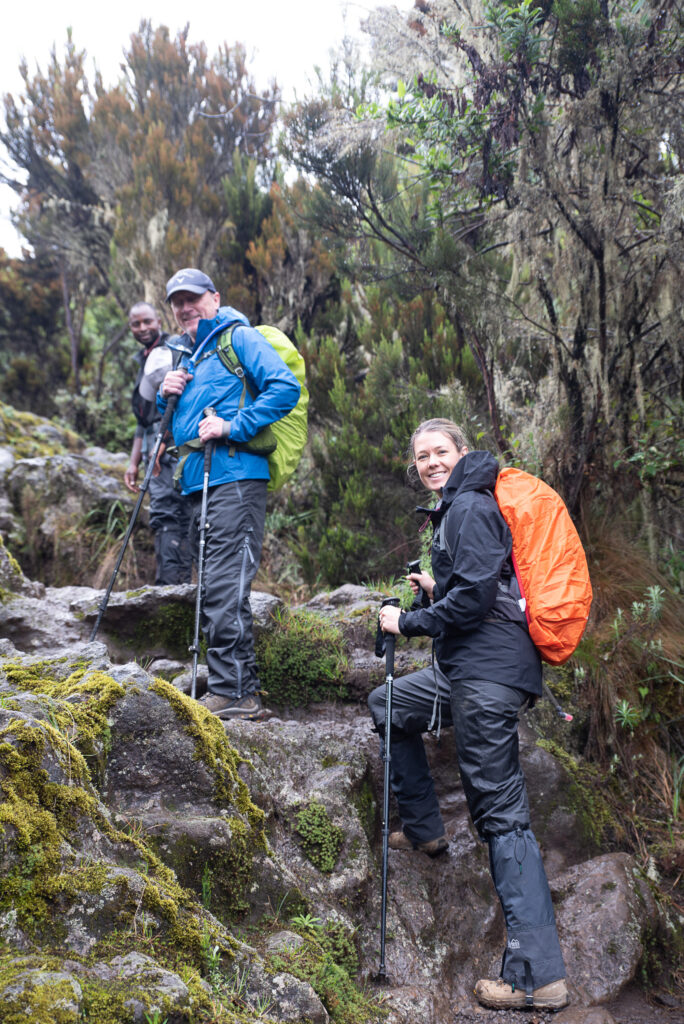
Climbing Kilimanjaro. Photo: © G Adventures
Peter So the ultimate responsible tourism?
Leah Exactly. We call it community tourism – that’s what we focus on. I think that’s an ever-evolving conversation of eco tourism to responsible tourism, to regenerative tourism, to sustainable tourism – I think it’s all about doing good. Now more than ever, there’s a big conversation to be had around the environment and travel. We’ve seen since Covid, a lot of people haven’t been flying and their emissions have been cut.
People are always going to travel; they are. And it’s now saying that if you are going to travel, look at how you can travel more responsibly in terms of your emissions and your effect on the environment and your impact on the environment. I don’t think that we can justify pure selfish travel anymore. If you’re going to be going away, you need to be also having a positive impact on the local people whose homes you’re effectively going to stay in, and realise that you can have an incredible experience, but also really help change lives on the other end.
Felice If people want to find out more about G Adventures or book with them, how do they do that?
Leah They can go to our website, which is www.gadventures.com, or they can call us. We have a call centre which they can get the number off the website; our travel consultants are there to answer any questions and help connect them to the best tour for them.
Peter Leah Whitfield, thank you very much for appearing on the show today and we wish you the very best of luck with your travels, as Covid dies down in the world once again.
Leah Felice, Peter, it’s been an absolute pleasure. Thank you so much.
Felice That’s all for now. If you’ve enjoyed the show, please share this episode with at least one other person! Do also subscribe on Spotify, i-Tunes or any of the many podcast providers – where you can give us a rating. You can subscribe on Spotify, Apple Podcasts or any of the many podcast platforms. You can also find us on Twitter, Facebook and Instagram. We’d love you to sign up for our regular emails to [email protected]
© ActionPacked Travel
![]()
- Join over a hundred thousand podcasters already using Buzzsprout to get their message out to the world.
- Following the link lets Buzzsprout know we sent you, gets you a $20 Amazon gift card if you sign up for a paid plan, and helps support our show.
